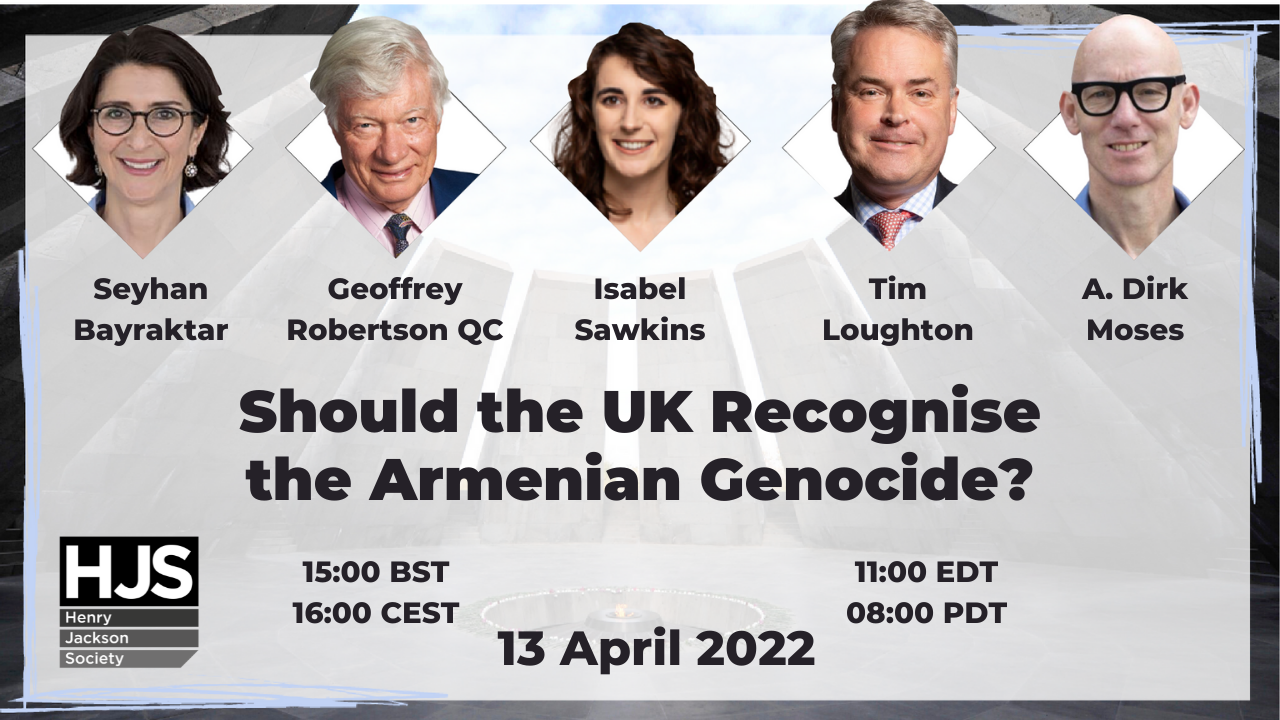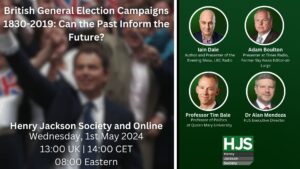Should the UK Recognise the Armenian Genocide?

- This event has passed.
Should the UK Recognise the Armenian Genocide?
13th April 2022 @ 3:00 pm - 4:00 pm

The UK is lagging behind the world in recognising the Armenian Genocide. Democratic nations including the United States, France, and Germany have recognised it, as have the devolved parliaments of Scotland, Wales, and Northern Ireland. And yet, we have failed to do so, citing reasons that include: the fact that the term “genocide” did not exist in 1948, and that it should be a matter for Turkey and Armenia to sort out between themselves.
The Henry Jackson Society is pleased to gather world experts to discuss why the UK government should recognise this genocide and what parliamentarians are doing to make this a possibility.

Seyhan Bayraktar is research associate and head of the PhD programme at the Zurich University of Applied Sciences` School of Management and Law. She received her PhD in Political Science from the University of Konstanz in 2009. Her research areas include the politics of memory and apology, in particular the denial politics of Turkey with regard to the Armenian genocide. She has published widely about the ongoing denial of Turkey as well as the role and responsibility of the international community in terms of acknowledgement and recognition in a number of articles (e.g. “The Politics of Denial and Recognition: Turkey, Armenia and The EU”, in Alexis Demirdjian (ed.), The Armenian Genocide Legacy, (New York, 2016); “The Grammar of Denial: State, Society, and Turkish-Armenian Relations.”, in International Journal of Middle East Studies 47(4), 2015)

Prior to Parliament, Tim Loughton worked in the private sector as a fund manager in the City of London before becoming a Director at Fleming Private Asset Management. Tim was first elected to Parliament in 1997 as Member for East Worthing and Shoreham and has been re-elected in 2001, 2005, 2010, 2015, 2017 and 2019.
Tim has held various positions during his time in Parliament. He was Shadow Minister for Environment from 2000, Shadow Minister for Health and Children from 2001 (3) during the Conservative Party’s time in opposition. He was appointed Parliamentary Under-Secretary for Children and Families following the 2010 General Election until 2012 leading on several areas of successful reform in child protection, child sexual exploitation and adoption in particular.
From the backbenches, he continues to work vigorously in support of improving the life chances of children and young people and making sure their voices are heard in Parliament. Tim chairs the All-Party Parliamentary Group for Conception to Age 2 (first 1001 days) which is undertaking important work to improve Government’s work in peri-natal mental health and strong attachment for young children. He sits on the influential Home Affairs Select Committee. Tim chairs a number of All-Party Parliamentary Groups covering a wide range of issues, such as Tibet, Archaeology, The British Museum, Armenia and Yemen, as well as co-chairs the APPG for Mindfulness and APPG for Children. Tim was also elected as Vice Chair of the All-Party Groups on Youth and Care Leavers.
As Chair for the All-Party-Parliamentary Group for Armenia, Tim put forward a Bill in Parliament asking Her Majesty’s Government formally to recognise the Armenian genocide of 1915-23; and for connected purposes which formally recognised the genocide of the Armenians in the period 1915 to 1923 and sought to establish an annual commemoration to the victims of the Armenian genocide.
In 2019 he successfully piloted one of the most comprehensive Private Member’s Bills through Parliament which instituted civil partnerships for opposite sex couples; gives power to coroners to investigate stillbirths and enables mothers to enter their name on marriage certificates for the first time.
As well as continuing as a Vice-President of the Local Government Association (LGA), Tim has recently joined the Conservatives Against Racism For Equality (CARFE) as an advisory Board Member.

Professor A. Dirk Moses is Frank Porter Graham Distinguished Professor of Global Human Rights History at the University of North Carolina at Chapel Hill. He edits the Journal of Genocide Research and is the author of The Problems of Genocide: Permanent Security and the Language of Transgression (Cambridge, 2021).

Geoffrey Robertson QC is founder and joint head of Doughty Street Chambers. He has had a distinguished career as a trial and appellate counsel, an international judge, and author of leading textbooks. He is also an author of the book “An Inconvenient Genocide – Who Now Remembers the Armenians?”, published by Biteback.
He has argued many landmark cases in media, constitutional and criminal law, in the European Court of Justice; the European Court of Human Rights; the Supreme Court (House of Lords and Privy Council); the UN War Crimes courts; the World Bank’s International Centre for Settlement of Investment Disputes (ICSID) and in the highest courts of many commonwealth countries.
Geoffrey has, as a jury advocate, appeared in many criminal trials at the Old Bailey and libel trials in the High Court. He has appeared in several hundred reported cases in the Court of Appeal (both civil and criminal divisions) and in judicial reviews in the High Court, and in subsequent appeals. He has a large advisory practice, for clients including governments, media corporations, NGO’s and local councils.

Isabel Sawkins is a Research Fellow at the Henry Jackson Society. She has a BA in Modern Languages at Durham University and an MA in Political Sociology of Russia and Eastern Europe at UCL. She is currently completing a PhD on Holocaust memory in the Russian Federation at the University of Exeter, funded by the South West and Wales Doctoral Training Partnership (part of the Arts and Humanities Research Council). Isabel has presented her research at numerous international conferences. She has also published her findings in academic journals, as well as contributing to online media outlets. Isabel’s most recent accomplishment was the curation of an online exhibition about a Nazi death camp in occupied Poland.
***
EVENT SUMMARY
On the 13th April, Isabel Sawkins, Research Fellow at the Henry Jackson Society, Dr Seyhan Bayraktar, head of PhD programme at the Zurich University of Applied Sciences` School of Management and Law, Geoffrey Robertson QC, founder of Doughty Street Chambers, Tim Loughton MP, Chair for the All-Party-Parliamentary Group for Armenia, and Professor Anthony Moses, Editor-in-chief of the Journal of Genocide Research, discussed whether the British government should recognise the Armenian genocide.
Isabel Sawkins began the discussion by introducing the topic of the event and the speakers. Dr Bayraktar discussed her research on the denial of the Armenian genocide in Turkey from the 1970s onwards and how it grew from a marginal topic to a dominating force in society. She discussed official Genocide denial of Turkey and its impacts on minorities in the country. Geoffery Robertson QC spoke about the definition of genocide and how the Entente identified the Armenian genocide as uniquely horrific event. He spoke how the Armenian genocide served as an inspiration for Hitler and past British attempts avoid calling it a genocide. Tim Loughton MP discussed the current efforts to recognise the Armenian genocide in Parliament and how Armenian culture and heritage is still being expunged from Turkey, as well as with the current ethnic cleansing of Armenians in Nagorno-Karabakh. Professor Moses spoke about how academics are able to ask the questions that politicians and policy makers do not ask. He discussed why genocide is the crime of crimes and what official recognition actually means, as well as the selective approach British institutions have in deciding what events qualify as a genocide.
The discussion closed with two questions to the speakers which were, will failure to label it a genocide encourage more violence against Armenians and if the UK did recognise the Armenian genocide would it disrupt the Armenian-Turkish normalisation process.
RELATED EVENTS
British General Election Campaigns 1830-2019: Can The Past Inform The Future?”
The British general election is the linchpin of our liberal democracy, and its results are often fundamental to how we live. With the next UK general election looming, there is therefore … Continued



